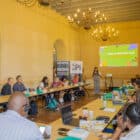English
Caribe Fest: A snapshot of the first day’s agenda
|
The Center for Investigative Journalism (CPI, in Spanish) kicked-off the Caribe Fest today with a call from its Executive Director, Carla Minet, to promote collaborative investigations, particularly among journalists from the Caribbean, a region that is united by common problems and experiences such as the climate crisis, which is the central theme of this event that takes place through this Saturday in Old San Juan. During the workshop “How to work collaborative investigations among media outlets,” Minet explained that collaborative writing is usually on topics that require a significant resources and experience. The CPI, based in Puerto Rico, has a long history of publishing investigative journalism in collaboration with media outlets in the United States, Latin America, and the Caribbean. Minet’s experience in this type of collaborative projects has shown that they tend to be more efficient because it allows costs and resources to be distributed, there is greater transparency in the findings, and the validation of the information. “What networking journalism does is broadens the scope of investigations and the possibility of having a greater impact,” said the Puerto Rican journalist.




